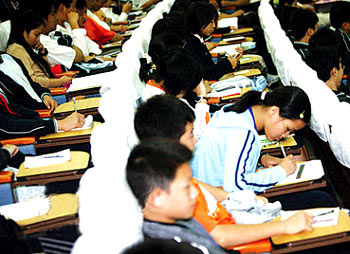| Tools: Save | Print | E-mail | Most Read |
| Experts: More Respect for Children's Rights and Positions |
| Adjust font size: |
What is the most annoying and difficult thing to children? What is the root cause of trouble in Chinese education for children? Sociologists raised these questions at the 2006 China Development Forum on Juveniles held in Nanjing, capital city of east China's Jiangsu Province, on September 17, the Yangtze Evening Post reported on September 18. "We feel unhappy with studies," said some primary school student representatives from Nanjing at the forum where experts put the blame on heavy lesson burdens.
A student representative is doing her homework at the 2006 China Development Forum on Juveniles held in Nanjing on September 17. The forum released a poll conducted by the Nanjing Fuzimiao Primary School among its 120 students. To the question "are you happy with studies?" 69 percent said no. "How do you arrange your weekends' life?" 57 percent said they go to training classes or take after-school lessons, and 32 percent do homework. Only 11 percent say they get free time. Most surveyed students say they feel heavy pressure coming from parents and schools. Sun Xiaoyun, vice director of the China Youth and Children Research Association, said that according to American psychologist Linda Kamras' research, three-year-old American children smile 55.6 percent more than Chinese children of the same age. "So American children are happier than Chinese contemporaries," Sun said. In China, during a child's development, parents take on all responsibilities upon themselves and often have too high expectations. "That is the root cause of trouble in Chinese education," said Sun whose words sparked active debate. Zhou Xiaohong, a professor from the Nanjing University, said that nowadays parents place too much pressure on their children. "Some parents might be driven by their childhood desire to become outstanding. They want to impose the desire on their children," Zhou said. Investigation statistics show that a great proportion of Chinese children watch CCTV News program in addition to children's programs. Prof. Zhou worried that if this was due to parents imposing their will on their children, it would be a great sorrow. "Inculcating too many things to children which don't conform to their age is sure to put too much pressure on them," he said. Zhou pointed out that a surplus of after-school classes and heavy homework do not allow children to manage their time. "Some parents don't let their children free even for one hour, because they are afraid that their children may lag behind others." Educationists have called for a reduction of lessons for many years, but the burden keeps growing heavier. As children grow up, parents try to design a "bright future" for them, paying no heed to their capabilities and interests. According to a series of investigation conducted by the China Youth and Children Research Association, 91.7 percent parents hope their children will receive junior college education or above, of which, 54.9 parents hope their children can get doctor's degree; 83.6 percent parents demand their children's examination results come top 15 in their grade rankings; 65 percents parents assign after-school homework for their children. Experts worried that children's talents may thus be smothered and potentially excellent children become mediocre in later life. "It is not wrong to make proper goals or pressure for children, but they must be given enough development space first," they suggested. In Sun's opinion, the heart of education is to help children develop healthy personalities instead of only teaching knowledge. Guan Ying, a sociological researcher from the Tianjin Academy of Social Sciences, said that in respecting minors' rights and positions, society can help minors blossom into independent people and can lead to satisfaction in later life. "Adults' ignoring of minors' rights have limited their development to a great extent and become the basic cause of the failure in family education," Guan said. According to her, "over-protection" from parents is equal to depriving children of their rights in a sense. "Pinning their childhood desires on the next generation, parents are unthinkingly letting children bear the pressures of social competitiveness," Guan said. "Meanwhile, it prevents children from giving full play to their own physical strength, intellectual power and rights to participate in social activities, and thus reduces their capabilities to survive and develop in the society." (China.org.cn by Li Jingrong, September 25, 2006) |
| Tools: Save | Print | E-mail | Most Read |
 |
| Related Stories |
| Product Directory China Search |
Country Search Hot Buys |
